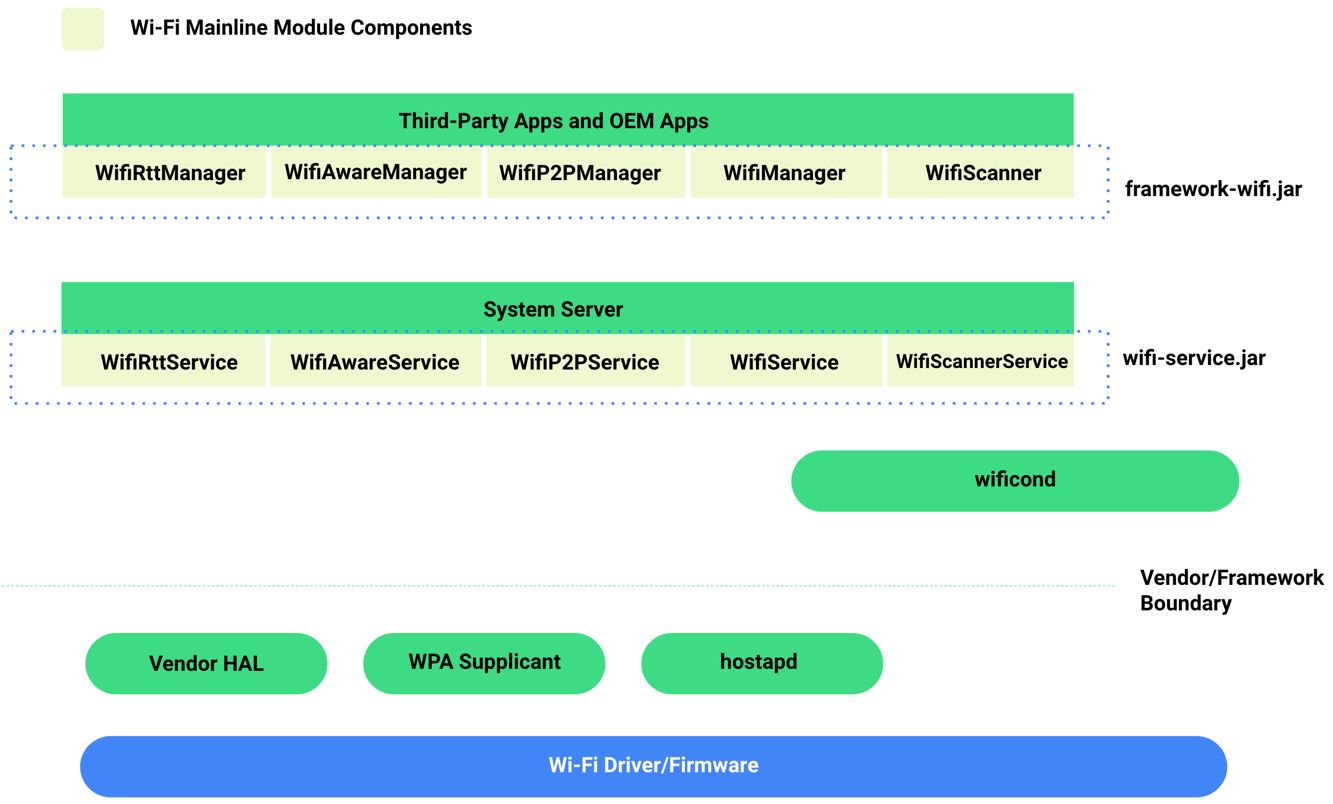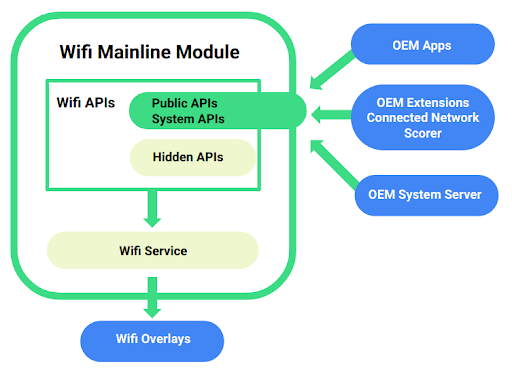The Wi-Fi module is updatable, meaning it can receive updates to capabilities outside of the normal Android release cycle. This module contains the following components.

Figure 1. Wi-Fi module components and architecture
The Wi-Fi module provides the following benefits.
End users get a consistent Wi-Fi experience across Android devices and fixes to interoperability issues through module updates.
App developers get reduced platform fragmentation.
OEMs can fulfill carrier requirements while also reducing costs for individual customizations (as they don't need different implementations of the same requirements in different ways).
Module boundary for Android 12 and Android 13
packages/modules/Wififrameworkjava/android/net/wifi(files fromframeworks/base/wifi/java)
tests/android/net/wifi(files fromframeworks/base/wifi/tests)
aidl-export/api/Android.bp
service/java/com/android/server/wifi(files fromframeworks/opt/net/wifi/service/java)
tests/com/android/server/wifi(files fromframeworks/opt/net/wifi/tests)
proto/Android.bpproguard.flagswifi.rc
OsuLogin/(files fromframeworks/base/packages/OsuLogin)ServiceResources/(new in Android 12, Overlay APK manifest is stored here)res/(new in Android 11, Wi-Fi configs extracted from fromframeworks/base/core/res/res)AndroidManifest.xmlAndroid.bp
WifiDialog/(new in Android 13 App to launch user dialogs requested by the service is stored here.)src/com/android/wifi/dialog(Contains the Activity the dialogs are launched from)
AndroidManifest.xmlAndroid.bp
The preceding directories also contain code that remains outside the modular system component and in its current location, for example:
wificond interface(classes in packageandroid.net.wifi.nl80211, for example,WifiNl80211Manager)- Sample Resource Overlay app
WifiTrackerLiblibwifi_hallibwifi_systemlibwifi_system_iface
OEMs can use the sample commands to help move their patches from the original project directories to the new project directory.
Move a patch from frameworks/base/wifi
Generating the patch file in root/frameworks/base/wifi
git format-patch -1 commit --stdout > patch-file.txtApplying the patch file to root/packages/modules/Wifi
git am -p2 --directory=framework/ patch-file.txtMove a patch from frameworks/opt/net/wifi
To move the patch from frameworks/opt/net/wifi, complex steps are needed
because the directory hierarchy was changed during the migration.
In frameworks/opt/net/wifi, split the commit into two commits, one for
service/ and one for tests/.
Migrating the HEAD commit
git reset HEAD^git add service/git commit # Enter your commit message. Call this commit service-commitgit add tests/git commit # Enter your commit message. Call this commit test-commit
Generating two commit patch files
git format-patch -1 service-commit --stdout > service-patch.txtgit format-patch -1 test-commit --stdout > test-patch.txt
Applying the two patches to packages/modules/Wifi
git am service-patch.txtgit am -p1 --directory=service/ test-patch.txt
Squashing the two commits back into one commit
git rebase -iChange the second commit's operation to squash.
Edit the commit message as appropriate.
Module boundary for Android 11
The Wi-Fi service continues to run inside the System Service process. The Wi-Fi
module includes all code in packages/modules/Wifi including the following.
- SDK and service classes for
WifiService,WifiP2pService,WifiAwareService,WifiScannerService, andWifiRttService OsuLoginServiceWifiResources
The module excludes the following components, which remain part of the OEM's AOSP build.
wificondnative component insystem/connectivity/wificondwificondinterface (classes in packageandroid.net.wifi.nl80211, for example,WifiNl80211Manager)android.net.wifi.SoftApConfToXmlMigrationUtilandroid.net.wifi.WifiNetworkScoreCacheandroid.net.wifi.WifiMigrationWifiTrackerLiblibwifi_hallibwifi_systemlibwifi_system_iface
Android 11 doesn't move files, but future releases might. To reduce the effort involved in porting file location changes, we recommend upstream as many changes as possible to AOSP (after porting them to Android 11 or refactoring proprietary extensions to use formal Android APIs or vendor HAL extensions to detangle them from AOSP code.
Module format
The Wi-Fi module (com.android.wifi) is in
APEX format and is available for devices
running Android 11 or higher. The APEX file includes
the following components.
- SDK library (
framework-wifi.jar) - Service library (
service-wifi.jar) - OsuLogin APK (
OsuLoginGoogle.apk) - Resource APK (
ServiceWifiResourcesGoogle.apk) - WFA certificates
Module dependencies
The Wi-Fi module depends on the following components.
- Connectivity
- Telephony
- Proto libraries
- Misc system components
- Wi-Fi HALs
wificondbouncycastleksoap2libnanohttpd
This module interacts with the framework using only stable @SystemApi (no
@hide API usage) and is signed with a Google signature instead of a platform
signature.
Customization
The Wi-Fi module doesn't support direct customization, but you can customize the config using runtime resource overlays (RROs) or carrier configs.

Figure 2. Wi-Fi module customization
- For small customizations, enable or disable settings in the RRO
config. - For more control, customize config values for any carrier configuration key
exposed as
@SystemAPI.
Use runtime resource overlays
You can customize the Wi-Fi module by overriding the default configurations
using RROs. For a list of overlayable configurations, refer to
packages/modules/Wifi/service/ServiceWifiResources/res/values/overlayable.xml.
For configuration behavior details, refer to
packages/modules/Wifi/service/ServiceWifiResources/res/values/config.xml.
For a sample overlay app, refer to
device/google/coral/rro_overlays/WifiOverlay/.
Because the device/google/coral/rro_overlays/WifiOverlay/AndroidManifest.xml
file sets the targetPackage attribute to com.android.wifi.resources and the
resource APK delivered by the Wi-Fi module has package name
com.google.android.wifi.resources, you must set the overlay APKS
targetPackage to com.google.android.wifi.resources to overlay Wi-Fi
configurations successfully.
Migrate configuration storage format
The Wi-Fi module can parse only the AOSP Wi-Fi configuration storage format. If
you've previously modified the Wi-Fi configuration storage format (which
includes the user's saved network list), you must convert that data to the AOSP
format when upgrading a device to any Android release that includes the Wi-Fi
module. The hooks needed for this conversion are in the
android.net.wifi.WifiMigration class.
Implement the format conversion in the following methods.
WifiMigration.convertAndRetrieveSharedConfigStoreFile(<storeFileId>)Invoked by Wi-Fi module to retrieve the Wi-Fi shared store file contents that have been converted to AOSP format.
These files were previously (in Android 10) stored in the
/data/misc/wififolder on the device.
WifiMigration.convertAndRetrieveUserConfigStoreFile(<storeFileId>)Invoked by Wi-Fi module to retrieve Wi-Fi user-specific store file contents that have been converted to AOSP format.
These files were previously (in Android 10) stored in the
/data/misc_ce/<userId>/wififolder on the device.
Access hidden Wi-Fi APIs
Symbols (classes, methods, fields, etc.) annotated with @hide in the Wi-Fi
module are not part of its public API surface and cannot be accessed on
devices with the module installed. Devices that don't include the Wi-Fi
module can continue to use @hide Wi-Fi APIs using the following steps.
Remove the visibility restrictions placed on
framework-wifiatpackages/modules/Wifi/framework/Android.bpby changing theimpl_library_visibilityattribute to public.java_sdk_library { name: "framework-wifi", ... impl_library_visibility: [ "//visibility:public", // Add this rule and remove others. ], ... }Change the build rule to allow library access
@hideWi-Fi APIs. For example, the following is a build rule for ajava_library.java_library { name: "foo-lib", // no sdk_version attribute defined libs: [ "dependency1", "dependency2", ], }To allow library access for
foo-lib, change the build rule as follows:java_library { name: "foo-lib", sdk_version: "core_platform", libs: [ "framework-wifi.impl", "framework", "dependency1", "dependency2", ], }Ensure that
framework-wifi.implappears beforeframeworkin the list oflibs. The order of dependencies in thelibsattribute is significant.
Access hidden framework APIs
Symbols annotated with @hide outside the Wi-Fi module can't be accessed by
code within the Wi-Fi module. Devices that don't include the Wi-Fi module can
continue to use @hide external APIs (for example, from framework.jar) in
service-wifi by making the following modifications to
frameworks/opt/net/wifi/service/Android.bp.
In both
wifi-service-pre-jarjarandservice-wifi, change thesdk_versionattribute tocore_platform.In both
wifi-service-pre-jarjarandservice-wifi, addframeworkandandroid_system_server_stubs_currentto thelibsattribute.Verify the result is similar to the following code sample.
java_library { name: "wifi-service-pre-jarjar", ... sdk_version: "core_platform", ... libs: [ ... "framework", "android_system_server_stubs_current", ], } ... java_library { name: "service-wifi", ... sdk_version: "core_platform", ... libs: [ ... "framework", "android_system_server_stubs_current", ], }
Testing
The Android Compatibility Test Suite (CTS) verifies the Wi-Fi module's capabilities by running a comprehensive set of CTS tests on every module release. You can also run the tests described in Test, debug, and tune Wi-Fi.
